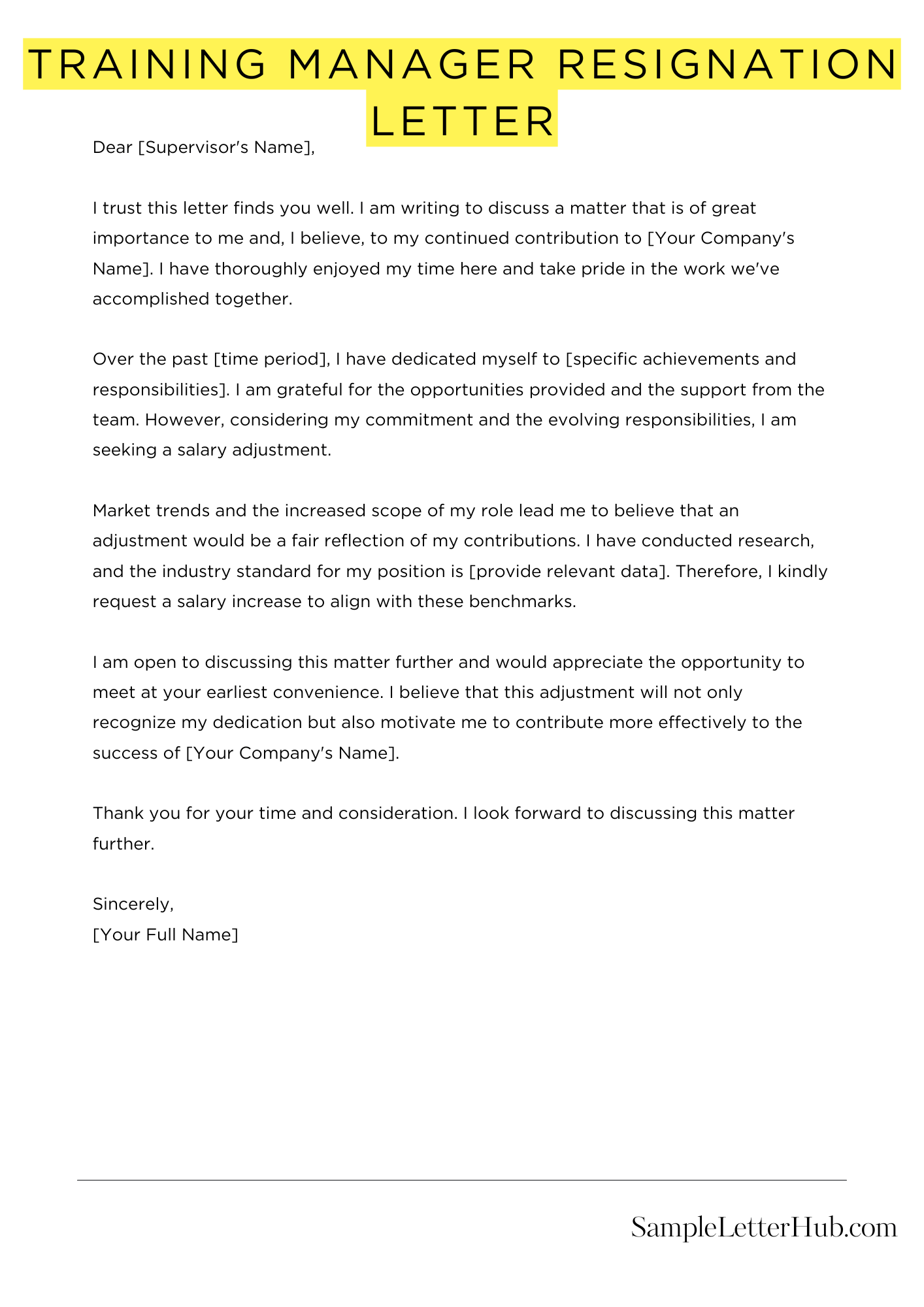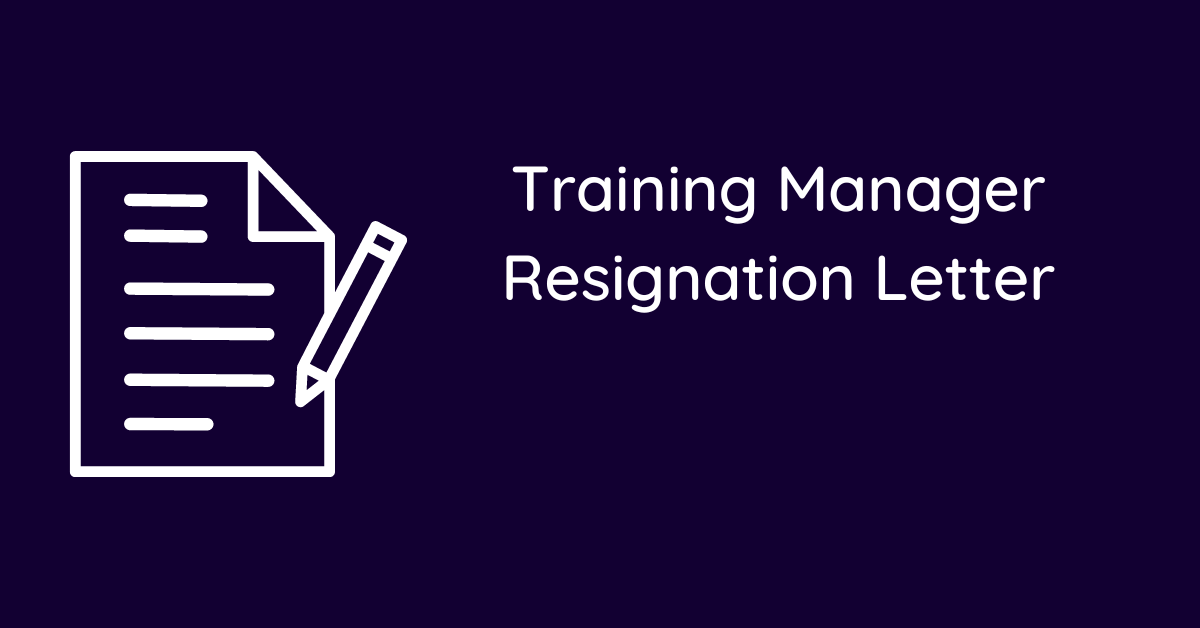Hey there! If you’re here because you’re a training manager looking to move on to new pastures, then you’re in the right place. We’re going to share an example of a training manager resignation letter with you that you can use as inspiration.
One of the best ways to leave a job is to write a clear and professional resignation letter that explains your decision to leave. It’s important to be polite and humble in your letter, even if you’re not happy with your current situation. Remember, it’s always better to leave on good terms.
Below, we’ve shared a template/example training manager resignation letter that you can use. Feel free to adapt it to your own circumstances.
Training Manager Resignation Letter
Dear [Recipient Name],
Please accept this letter as formal notification that I will be resigning from my position as Training Manager at [Company Name], effective two weeks from today, [Last Date of Employment].
During my tenure, I have had the privilege of working alongside a talented team and contributing to the development of the company’s training programs. I am grateful for the opportunities and experiences I have gained.
I wish [Company Name] all the best in the future.
Sincerely,
[Your Signature]
Short Training Manager Resignation Letter Sample
Please accept this letter as formal notification that I am resigning from my position as Training Manager at [Company Name]. My last day of employment will be [Your Last Day]. Thank you for the opportunity to grow and learn during my time here. I wish you and the company continued success. I am happy to assist in the transition process to ensure a smooth handover of my responsibilities.
I wish you all the best with your training manager resignation letter.
When it’s time to say farewell, expressing your gratitude and best wishes can make the transition smoother:

How to Write a Training Manager Resignation Letter
1. Start with a Formal Introduction
Begin your letter with a formal salutation, such as “Dear [Manager’s Name].” Clearly state your intention to resign from your position as Training Manager, including the date your resignation will take effect.
2. Express Gratitude and Appreciation
Take this opportunity to express your gratitude for the opportunities and experiences you’ve gained during your time at the company. Mention specific projects or initiatives that you’re proud of and thank your manager for their support and guidance.
3. State Your Reasons for Leaving
While it’s not necessary to go into excessive detail, it’s helpful to briefly explain your reasons for leaving. Be honest and professional, focusing on positive aspects such as seeking new challenges or pursuing personal growth.
4. Offer to Assist with the Transition
Demonstrate your commitment to a smooth transition by offering to help train your replacement or assist with any ongoing projects. This shows that you’re not just leaving the company, but that you care about its success.
5. End with a Professional Closing
Close your letter with a formal closing, such as “Sincerely” or “Best regards.” Include your signature and typed name below.
Training Manager Resignation Letter: 6 FAQs
Resigning from any position can be a daunting task, and crafting a Training Manager Resignation Letter is no exception. To help you navigate this process, here are six frequently asked questions and their answers:
1. What should I include in my resignation letter?
Your resignation letter should include the following key elements:
- A clear statement of your intent to resign
- Your last date of employment
- A brief expression of gratitude for the opportunity to work at the organization
- Any relevant details, such as any outstanding projects or responsibilities
2. How formal should my resignation letter be?
The formality of your resignation letter will depend on the company culture and your relationship with your manager. In general, it’s best to err on the side of formality, using professional language and a respectful tone.
3. Should I give a reason for my resignation?
It’s not necessary to provide a detailed explanation for your resignation in your letter. However, you may choose to briefly state your reason for leaving, such as pursuing a new opportunity or returning to school.
4. How much notice should I give?
The amount of notice you give will depend on your contract and company policy. It’s generally considered good practice to give at least two weeks’ notice, but you may want to give more if you have a lot of responsibilities or if you’re leaving on good terms.
5. What should I do if I’m feeling emotional about leaving?
It’s perfectly normal to feel emotional about leaving a job, especially if you’ve been there for a long time. If you’re struggling to write your resignation letter, you may want to take some time to reflect on your experiences and what you’ve learned. You can also talk to a trusted friend or family member for support.
6. What if I’m worried about my manager’s reaction?
It’s understandable to be concerned about how your manager will react to your resignation. The best thing you can do is to be professional and respectful in your letter and in person. If you have a good relationship with your manager, you may want to schedule a meeting to discuss your resignation in more detail.
Before making the decision to resign from your job, it’s essential to consider the legal aspects:
Understanding your emotions after quitting your job is important. Explore why you might be feeling sad:
Related
- Resignation letter sample
- Forced resignation letter
- Resignation letter due to going abroad
- Resignation letter due to marriage
- Resignation letter due to other opportunity
- Resignation letter due to mistake

